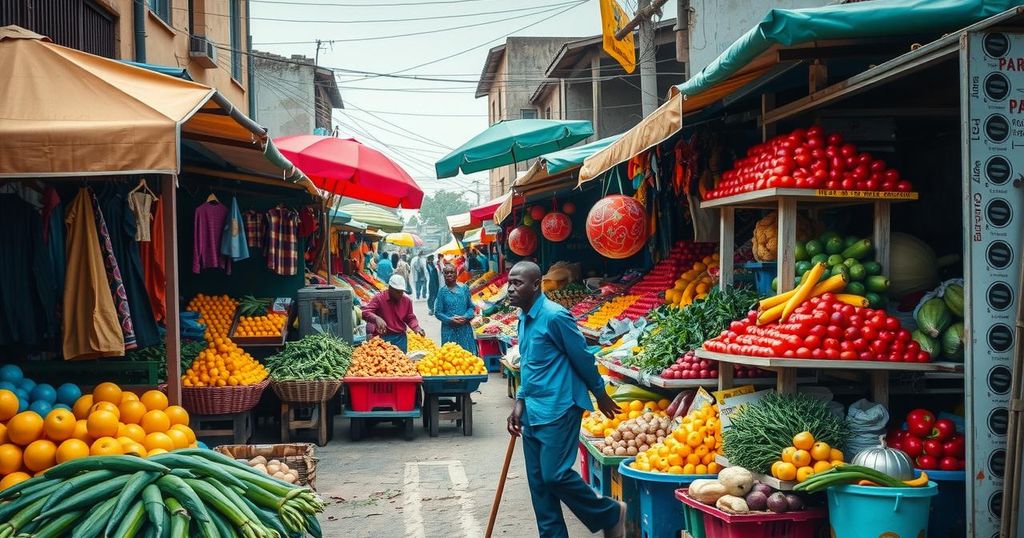Zimbabwe Police Crackdown on Informal Vendors Raises Economic Concerns
In Harare, Zimbabwe, municipal police continue to crack down on informal vendors, causing chaos and panic. Critics argue the council’s focus on enforcement wastes vital resources needed for basic services. As the economy struggles, vendors play an essential role but face challenges including high fees and constant threats from authorities. The debate continues over how to support them while maintaining city order.
In Harare, Zimbabwe, the city’s municipal police have ramped up their efforts to crack down on informal vendors, often leaving emotional tolls and financial devastation in their wake. Onlookers can catch a glimpse of the chaos that ensues when municipal officials descend upon vendors, who are selling wares with little warning. Vendors scuffle with authorities, risking injury as they abandon their goods to escape. Saul Nhema, a vegetable seller, conveys the frustration on the ground: “They have no mercy at all. Once they take your stock, you’ll never get it back.”
This relentless pursuit has been a long-term strategy by the Harare City Council, which claims that such crackdowns are necessary to enforce local bylaws designed to maintain urban order. However, the increasing intensity of these operations has led to some sharp criticism. Observers question the wisdom of using limited resources to target informal vendors when basic services, such as clean water, are insufficiently provided to residents.
In a striking statistic, the council’s revenue reached just $3 million in 2024, while the costs associated with policing these crackdowns soared to over $24 million—eight times the council’s income. The situation only appears to worsen; in 2025, a specialized police unit was created expressly for the purpose of targeting vendors, further burdening the city’s financial strain. Projections suggest that income could fall to merely $2 million in the coming year.
With the central government stepping in to shoulder much of this financial burden, many residents express their concerns. The idea of enforcing regulations rather than supporting informal vendors seems to create more problems than it solves. “If we examine the funds allocated for enforcement…those resources could have been redirected toward rehabilitating markets or public restrooms in the city,” argues Reuben Akili, the director of the Combined Harare Residents Association. This notion brings to light that informal vendors play a crucial role in sustaining Zimbabwe’s struggling economy.
Over 80% of the population relies on the informal sector, which contributes about 72% to the nation’s gross domestic product. Street vendors, often women, face a precarious existence while their livelihoods are threatened. The ongoing currency crisis has only intensified the urgency of finding avenues for informal vendors to thrive.
Officially designated vending areas exist, but these are often dismissed by vendors due to exorbitant rental costs and limited customer access. The barriers to entry, including formal business licenses costing between $400 and $800 annually, can be insurmountable for many, especially when the economy has been grappling with turbulence for years.
The challenge, according to Samuel Wadzai, director of the Vendors Initiative for Social and Economic Transformation, is achieving a balance where local authorities enforce regulations without alienating the informal economy at a time when so many depend on it for survival. Wadzai reflects on the futility of past efforts, saying no significant change has come from pushback tactics.
As the constant pressure looms, vendors may choose to pay bribes to avoid harassment during work hours. Jesman Guvheya, a mother of five who has endured the harsh realities of informal vending, notes: “The police sometimes demand $1 a day from each vendor.” In practice, daily encounters could lead to multiple payments, spiraling up to $4 just to maintain a semblance of normality in their operations.
But paying a bribe does not ensure a smooth day of sales. As Guvheya points out, even after paying, police could still take everything with no warning. In a recent scare, she had to watch her son get apprehended during a raid, and she rushed to negotiate his release. This cycle of fear, frustration, and evasion permeates the world of informal vendors, highlighting both their crucial role in the economy and the socio-economic precipice they stand on.
In summary, the intensified actions of the Harare municipal police against informal vendors have raised significant concerns about resource allocation amid a struggling economy. While city officials argue these crackdowns maintain urban order and public health, critics point out the severe financial and social implications for vendors. With over 80% of Zimbabweans reliant on informal work, the government faces increasing pressure to find a solution that balances enforcement and support for vulnerable populations.
Original Source: www.thezimbabwean.co




Post Comment